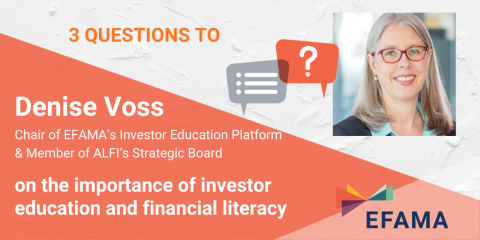Q #1 How important are investor education and financial literacy?
The old-age dependency ratio in the EU continues to increase; Eurostat’s recent figures project that by 2050, there will be fewer than 2 working-age adults for each person aged 65 or older, versus just under 3 today. As a result, public pensions will be under growing pressure and citizens will be increasingly responsible for their own financial well-being. Initiatives such as the Pan-European Personal Pension Product (PEPP) are a step in the right direction however the fact is that citizens must significantly increase how much they save and invest; for retirement but also for other financial goals such as buying a home and paying for higher education.
Research has shown that as people become more financially literate, they make better saving and borrowing decisions, are more likely to plan for retirement and diversify their financial wealth from bank deposits into capital market instruments. Unfortunately, individuals’ knowledge of basic financial concepts such as compound interest rates, inflation and risk diversification is very poor. Hence, financial literacy is considered today to be a fundamental life skill, as it is essential for society and the economy to have well-informed citizens who understand the risks and opportunities of investing and who are capable of managing their personal finances.
Much has been done in the field of regulating financial information, advice and financial products. However, if consumers do not have the basic knowledge to understand these concepts, then that regulation may be in vain. Therefore, it cannot be stressed enough that there is a clear need to improve financial literacy and to broaden efforts to educate investors.
Q #2 What is the role of the asset management industry in the area of investor education?
Commissioner McGuinness stated in her speech at the European Retail Financial Forum in 2021 that “Greater participation in retail investment can only work if consumers understand the products they want to invest in and the information they receive.”
Asset managers and other actors in the industry, as experts on investing and investment products, are well placed to provide investor education on several levels, while ensuring that it is objective and unbiased. It is necessary to educate end investors, so that they can better assess risk and receive investment solutions which fit their needs. EFAMA also believes in the need to educate financial intermediaries given their privileged relationship with retail investors. Finally, the asset management industry has an important role to play in national strategies for financial education, as an important private sector partner providing investment expertise to the public sector institutions organising the local initiatives in schools, in companies and elsewhere in society.
Q #3 Can you highlight the sort of initiatives taken by EFAMA in this area?
EFAMA has been arguing for many years that there is a clear need to improve financial literacy through better, more widespread financial and investor education initiatives. EFAMA published in 2014, its first “Report on Investor Education: Building Blocks for Industry Driven Investor Education Initiatives” and work is underway to update the report. As for the 1st edition, the updated report will feature EFAMA and its members’ contributions to practical solutions for moving forward with investor and financial education initiatives.
As investing can seem daunting for many individuals, EFAMA has prepared a leaflet to provide young professionals with tips and guiding principles that can help them to make a start at investing their savings. The EFAMA “Investing for a better future – 5 tips to do more with your savings” was launched on 6 October 2021, during the IOSCO World Investor Week, with a webinar focusing on “Meeting the needs of a new generation of investors – the role of the financial sector”. The leaflet is available in digital format and will be translated into local languages for use by EFAMA members and everyone involved in investor education initiatives, with the goal of broadening the reach of the leaflet for the benefit of young professionals and other citizens in Europe and elsewhere in the world.


























